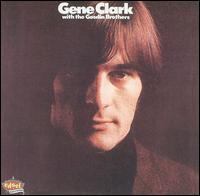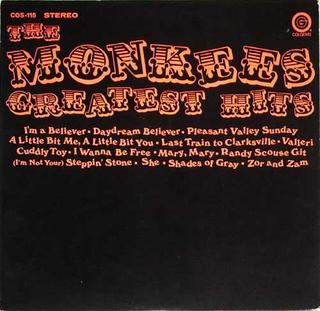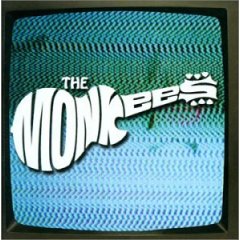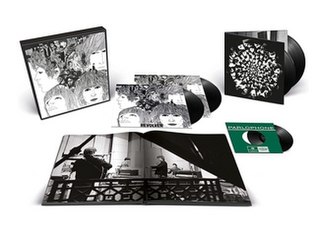
Headquarters is the third album by the Monkees, released in May 1967 after the first season of their television series had concluded. It was the first album on which the group members made substantial songwriting and instrumental contributions, rather than relying on session musicians and professional songwriters. After a struggle for creative autonomy with their record label, the group had been allowed, to a degree, to record by themselves. Headquarters became the group's third consecutive No. 1 album on the Billboard 200 chart and was certified double platinum in the United States with sales of more than two million copies within the first two months of release. It also peaked at No. 2 on the UK charts. It is included in the 2006 book 1001 Albums You Must Hear Before You Die.

More of the Monkees is the second studio album by the American pop rock band the Monkees. It was recorded in late 1966 and released on Colgems label #102 on January 9, 1967. It displaced the band's own debut album from the top of the Billboard 200 chart and remained at No.1 for 18 weeks—the longest of any Monkees album. Combined, the first two Monkees albums were at the top of the Billboard chart for 31 consecutive weeks. More of the Monkees also went to No.1 in the UK. In the U.S. it has been certified quintuple platinum by the RIAA with sales of more than five million copies. More of the Monkees is also notable for being the first pop/rock album to be the best-selling album of the year in the U.S.

The Monkees is the debut studio album by the band the Monkees. It was released in October 1966 by Colgems Records in the United States and RCA Victor in the rest of the world. It was the first of four consecutive U.S. number one albums for the group, taking the top spot on the Billboard 200 for 13 weeks, after which it was displaced by the band's second album. It also topped the UK charts in 1967. The Monkees has been certified quintuple platinum by the RIAA, with sales of over five million copies.

The Monkees Present is the Monkees' eighth album. It is the second Monkees album released after the departure of Peter Tork and the last to feature Michael Nesmith until 1996's Justus.

Instant Replay is the seventh studio album by the Monkees. Issued 11 months after the cancellation of the group's NBC television series, it is also the first album released after Peter Tork left the group and the only album of the original nine studio albums that does not include any songs featured in the TV show.

More Greatest Hits of the Monkees is a 1982 greatest hits compilation album of songs by the Monkees, assembled and released by Arista Records. Rather than featuring strictly hit singles, the collection also featured music from their television series, which was still airing in syndication around the US.

Gene Clark with the Gosdin Brothers is the debut solo album of Gene Clark, released in February 1967 on Columbia Records, catalogue CS 9418. It was his first effort after his departure from folk-rock group the Byrds in 1966. The music is a unique mixture of pop, country rock and baroque psychedelic tracks, which received favorable reviews and reinforced Clark's stature as a talented singer-songwriter. Unfortunately for Clark, it was released almost simultaneously with the Byrds' Younger Than Yesterday, also on Columbia, and partly because of his 18-month absence from public attention was a commercial failure.

The Monkees Greatest Hits is the first greatest hits compilation album by the Monkees, issued by Colgems in June 1969.

The Monkees Anthology is a two-CD compilation set by the Monkees issued in 1998, and is the first collection to include material from their most recent studio album at the time, Justus. It includes almost all the original singles and B-sides, as well as a TV rarity and one live track.

"A Little Bit Me, a Little Bit You" is a song written by Neil Diamond, recorded by the Monkees in 1967 and released as a single on the Colgems label. The lead vocal was Davy Jones' first on a Monkees single. The single reached No. 1 on the Cashbox Top 100 chart, while on the Billboard Hot 100 it reached No. 2, with "Somethin' Stupid" by Frank Sinatra and Nancy Sinatra keeping it from the top spot.
"All of Your Toys" is a song by The Monkees, recorded in 1967 but not released until 20 years later. The song was written by Bill Martin, a friend of The Monkees' Michael Nesmith. "All of Your Toys" was the first Monkees recording to feature all four members performing on the track.

"Randy Scouse Git" is a song written by Micky Dolenz in 1967 and recorded by the Monkees. It was the first song written by Dolenz to be commercially released, and it became a number 2 hit in the UK where it was retitled "Alternate Title" after the record company (RCA) complained that the original title was actually somewhat "rude to British audience". Dolenz took the song's title from a phrase he had heard spoken on an episode of the British television series Till Death Us Do Part, which he had watched while in England. The song also appeared on The Monkees TV series, on their album Headquarters, and on several "Greatest Hits" albums. Peter Tork said that it was one of his favorite Monkees tracks.

Summer 1967: The Complete U.S. Concert Recordings is a four CD live set by the Monkees, recorded during the band's Summer 1967 tour. The CD was a limited edition release, with 3,500 copies being made available by Rhino Hand Made.

The Definitive Monkees is a limited edition Monkees compilation album released in 2001. It contains 29 of the Monkees' greatest hits. The album includes two tracks from the 1980s reunions. The album featured a bonus disc which featured 31 of The Monkees' rarity songs.

Monkeemania is a two-disc Monkees compilation released in 2011. It contains 57 of the Monkees' songs, including hit singles, B-sides, album tracks and rarities. Several of these songs were unreleased in the 1960s, but were eventually issued on the Monkees' Missing Links archival compilation albums.

The Monkees: Original Album Series is a CD set by The Monkees which includes the first five albums by The Monkees. The CD set was released in 2010 as a slipcased box set.

Monkeemania is a Monkees compilation released in Australia in 1979. It contains 40 of the Monkees' songs, including hit singles, B-sides, album tracks and three previously unreleased tracks: "Love to Love," "Steam Engine" and a live version of "Circle Sky."

"The Girl I Knew Somewhere" is a song by the American pop rock band the Monkees, written by Michael Nesmith and first released as the B-side to the "A Little Bit Me, a Little Bit You" single on Colgems Records on March 8, 1967. It was distributed in support of the group's third album Headquarters, and later appeared on the reissued version of the LP. The song was recorded as the Monkees finally achieved the independence that enabled them to freely produce their own material, with the actual band members featured on both vocals and instrumental arrangements.
The Authorized Bang Collection is a compilation album by Van Morrison containing every track that Morrison recorded for Bang Records in the 1960s. It was released on April 28, 2017 by Legacy Recordings on the Bang label.

Revolver: Special Edition is an expanded reissue of the 1966 album Revolver by the English rock band the Beatles. It was released on 28 October 2022, and includes a new stereo remix of the album by Giles Martin, with the help of de-mixing technology developed by Peter Jackson's WingNut Films, as well as the original mono mix, session recordings, demos, and an EP including new mixes of the non-album single "Paperback Writer" and its B-side, "Rain", recorded during the Revolver sessions.

















